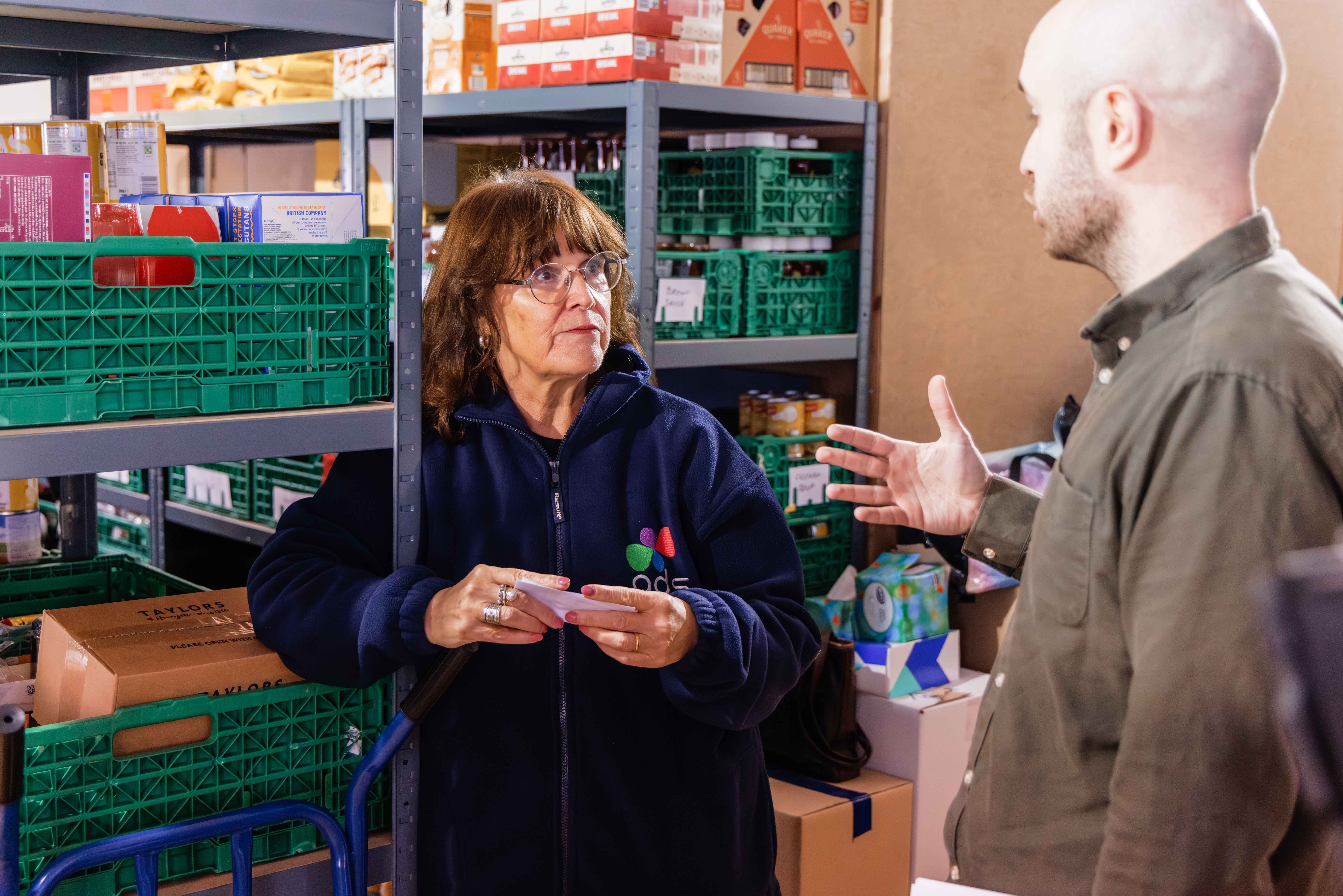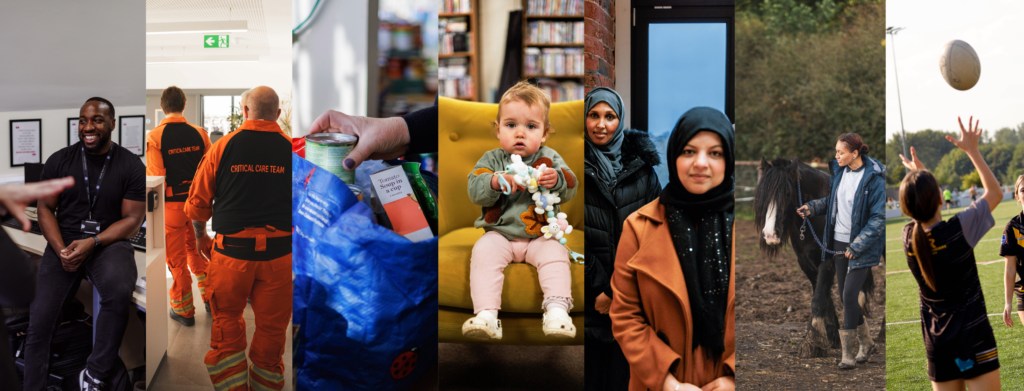
A chairman’s view: “Renting didn’t make financial sense”
Aspatria Dreamscheme wanted to expand its services but had run out of space. Adrian Cozens and Linda Hunter from Aspatria Dreamscheme explain why buying a new property was the best option and how they found the loan process.
Why did you need a new building?
Adrian: Before the pandemic, we were predominantly focused on youth work, but we set the food pantry up in 2020 and that brought in adults of all ages. Food poverty is linked to a huge range of other issues, such as loneliness, and those needs weren’t being met. There are a couple of cafés in Aspatria, but there are no lunch clubs or other community spaces for people to regularly meet. So, Linda and others wrote a vision document about including this wider section of society in our work. The problem was that we didn’t have anywhere to deliver these new services from.
Our existing building was youth orientated, with pool tables, music and so on. We were renting an old chapel for the food pantry. All our available space was taken up.
Very fortuitously, a building came up for sale less than 100 yards from our youth centre. It’s another old chapel and has a big open space downstairs, along with offices and other rooms upstairs. At first, we didn’t think we could afford it, but we were able to beat the owner down to something that came into the realms of affordability!
Why did you decide to buy a building rather than just rent one?
Adrian: We did ask whether we could rent the building to start with and then buy it at a reduced price later on. The owner wasn’t keen on that idea and the rental costs would have been substantially higher than the repayments on a loan to buy the property.
There weren’t any other suitable rental properties available. We couldn’t look further afield as we needed the services to be run locally. People who have £50 to live on a week can’t afford to spend 10% of that on bus fares. We considered just hiring a space part-time, but even the local churches turned us down.
So, we decided to buy the building to create our new community hub. Then we were faced with how on earth we were going to get a loan.
Why were you concerned about getting a loan?
Adrian: We don’t have a consistent income; we mainly have ad hoc grant income, which is generally for delivering services not covering core costs. That makes it tricky to get finance. But then we got a cheque for £19,500 from a charity that was closing down. Added to some of our reserves, that meant we could put 50% of the purchase price down as a deposit, which put us in a much stronger position for getting a loan.
How did you go about finding a loan?
Adrian: We originally went to another bank, but they couldn’t offer us the money and instead suggested we speak to Charity Bank. We did look at other loan providers too, but no one was interested. So, it was Charity Bank or bust!
We wrote a business plan, which we’ve never done before. And it turned out that the food pantry brings in around £800 a month, which would cover the loan repayments on the new building. So, we were able to go to Charity Bank with a decent deposit, a regular (albeit small) income, and a strong case that what we wanted to do would make a positive difference to the people of Aspatria.
How did you find the process of applying for the loan?
Adrian: To be honest, applying for the loan was a breeze, because Charity Bank were very clear about what they wanted from us. They often deal with people who’ve never done this before, so it’s in the bank’s best interests to make the process as simple as possible. They even specified how they needed the board minutes to read and so on, which took the guesswork away. It meant we could basically cut and paste things. It was very easy for me, Linda and our treasurer to sit down together and go, “OK, here’s exactly what we need to provide. Let’s get each one ticked off.”
Was it easy to get hold of someone at Charity Bank if you had a question?
Adrian: Charity Bank was always available if we had a question, and we always spoke to the same people, which was helpful. There’s nothing worse than just having a number to call and the person on the other end of the phone not knowing who you are or what you’re doing.
You already own your youth centre. Do you think owning this second property will help to strengthen the charity?
Adrian: Yes, definitely. If there had been an opportunity to rent some more space, then we might have taken it, but there would always have been the issue of the building not being under our control. We wouldn’t have had any flexibility to expand, develop or change that space. It’s much better to have control over our own space, and to be able to use it in a way that best suits our constantly changing needs.
Linda: Ownership also gives you security if something goes wrong. If you lease a building, you’re legally required to pay rent, even if a project closes and you’re no longer using the property. But if you own the building, you can sell it if you need to, and reinvest the money in your other services.
Will owning the building save you money?
Adrian: The rent would have been around £800 a month. We’re only paying around £600 on the loan repayments. And we’re allowed to pay the loan off early, so if we get a bequest or other large donation in, we can pay off a chunk of the loan.
Does owning a building help with grant applications?
Linda: Yes. We’re currently bidding for almost £100,000 for a proper kitchen, a lift, fire alarms and so on. You can’t apply for money to spend on somebody else’s building. Also, if you’re renting a space and putting in a funding bid, then a big chunk of the money ends up going to another organisation for rental costs. And you could lose that space at the end of your lease.
It makes more sense to use your funding to develop a long-term hub for the people you want to support, so that you can build long-term relationships with them.
What services do you plan to run from the new community hub?
Adrian: Some of our services for children and young people will move to the hub, including our Year Six and Year Seven school transition group. A new after-school club will help kids with homework and make sure they get a hot meal, which many of them wouldn’t otherwise get.
There will be craft sessions where parents and grandparents can pass skills down to the younger people. There will be loneliness groups like the Butterfly Club, which is our current ladies club, and the Making Men’s Club, which is all about self-worth and getting people together. We’ll also have lunch and dinner clubs, where we serve meals at cost price.
50% of the older people we work with don’t have a smartphone or use a computer. They need in-person services; an online course is no use to them. So, we want to have Citizens Advice and similar organisations coming in for an hour or two a week to help people.
We also want to teach people how to cook. We want to teach people basic cookery skills so that they can make the most of the food they’re getting through the pantry.
In short, it’ll be a proper community hub, whereas our youth club building will remain as a youth-only space.
Is it important that your loan repayments are going back into the social sector?
Adrian: I think it’s the most important thing that Charity Bank does. Without this loan, we couldn’t have bought the building so we wouldn’t be able to deliver some of our community programmes. So, it’s great to know that the interest we’re paying means that Charity Bank can help other organisations like us.
It’s about communities supporting communities. A lot of places have lost their sense of community over the last 50 years, with families moving further away from each other. Loans like this are helping communities to come back together again.
If your charity is looking to expand and you need a loan to achieve your ambitions, please call us on 01732 441919.
About Charity Bank
Charity Bank is the loans and savings bank owned by and committed to supporting the social sector. Since 2002, we have used our savers’ money to make more than 1280 loans totalling over £500m to housing, education, social care, community and other social purpose organisations.
Nothing in this article constitutes an invitation to engage in investment activity nor is it advice or a recommendation and professional advice should be taken before any course of action is pursued.


